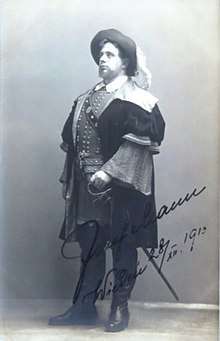Josef Mann
Josef Mann , also Joseph Mann or Józef Mann , (born February 24, 1883 in Lemberg , Galicia , Austria-Hungary , † September 5, 1921 in Berlin , Germany ) was an Austrian opera singer (tenor).
Life
Mann's hometown, where he was born as a child of Rudolf and Emily Mann, was part of the Crown Land of Galicia of the Danube Monarchy at the time of his birth . The whole family devoted itself to music and theater with the greatest interest. His three sisters Wilhelmine, Pauline and Frederike received piano lessons after they were six years old. Josef and his older brother Wilhelm learned to play the flute (Wilhelm also violin) from Josef Fredl during their school years.
Josef Mann began singing in the seventh grade of grammar school, performing as a soloist and in school choirs. The choir leaders recognized his vocal virtuosity and his above-average talent and sent him to singing lessons. In 1901 Josef Mann passed the Matura and began studying law at the University of Lemberg. At that time he sang as a bass baritone. In the Sunday concerts in the Armenian Cathedral he sang solo pieces, accompanied by Stanisław Fiszer on the organ and his brother Wilhelm Mann on the violin. After completing his studies, he completed the court year at the court in Lviv on Batorystraße and then worked in a law firm. In addition, from 1906 he continued his studies with Valery Wysocki . Here he met famous contemporary opera singers who made him want a stage career. In the years 1906-09 he often appeared at concerts. In 1908 he took part in the amateur performance of Moniuszki's “Verbum Mobile”, where he took over the baritone role of “Stach”. During this time Ludwik Heller was the director of the Lviv Opera.
Josef Mann was married to Janina Cybulska.
Career
With his first partner Jadwiga Dębicka , Josef Mann had his official debut in Lemberg on October 25, 1909, with the role of "Jontek" in Stanisław Moniuszko's opera "Halka". The enthusiastic audience asked for an encore several times. The contemporary critics Niewiadomski and Walter praised his vocal virtuosity, his clear diction and deep sound as well as his open play on the stage, which enchanted the audience in the Lviv newspapers. In 1910 he appeared in Verdi's " Aida " in the role of "Radames". His partner as "Aida" was Irene Heller. Mann sang as a tenor and started his great career. At the beginning of the 1910/11 season, Josef Mann became a member of the Lviv Opera ensemble for two years. His first gramophone recordings also date from this time, later on, mainly on " Pathé " and " Odeon ", around 50 recordings with German and Polish opera and song titles by the artist were made.
In 1912 the Italian singer Labla came to Lemberg for some guest appearances, where Bizet's opera Carmen was being prepared, in which Josef Mann also appeared. He also deepened his music studies with Guagni in Milan.
1912-15 he was engaged at the Vienna Volksoper . In 1915/16 he sang at the New Royal Court Theater in Wiesbaden; there he took over the role of the "devil" in the world premiere of Julius Bittner's " Das Höllisch Gold ". 1916-19 he worked at the Landestheater in Darmstadt. Guest appearances have taken him to Prague, Bucharest, Dresden, Stuttgart, Frankfurt am Main, Berlin, Munich, Basel and Vienna. In 1918 he signed a two-year contract with the Staatsoper Unter den Linden . Here he sang the title role in the Berlin premiere of Hans Pfitzner's “ Palestrina ” in 1919 .
During his engagement in Berlin, representatives of the Metropolitan Opera offered him a well-paid five-year contract. He was to take the place of the star tenor Caruso , who had resigned from the stage due to serious illness. Mann prepared for appearances in English and worked on the lead role in Korngold's " The Dead City ". On October 18, 1921, he wanted to start his journey to New York to reach the peak of his artistic career. Before that he should have appeared four times in “Aida” in Berlin. On September 5, 1921, Josef Mann suffered a heart attack while leaving the stage after the 2nd act and died on site.
Repertoire (selection)
|
|
Discography
- In 1979, Preiser Records Vienna released a record (LV74, "Lebendige Past"), which is currently (2008) unavailable, which exclusively contains recordings by Josef Mann from the years 1919–1921, including Halévy, Wagner, Verdi, Mascagni, Leoncavallo, Bizet and d'Albert.
literature
- Piotr Szalsza : Man, Józef. In: Oesterreichisches Musiklexikon . Online edition, Vienna 2002 ff., ISBN 3-7001-3077-5 ; Print edition: Volume 3, Verlag der Österreichischen Akademie der Wissenschaften, Vienna 2004, ISBN 3-7001-3045-7 .
- Arthur Eaglefield-Hull (Ed.); Alfred Einstein (arr.): Das Neue Musik-Lexikon. According to the Dictionary of Modern Music and Musicians . Max Hesses Verlag, Berlin 1925, p. 403. ( digitized )
- Karl-Josef Kutsch , Leo Riemens : Large singer lexicon . 3. Edition. Verlag KG Saur, Munich 1999, Volume 3, pp. 2193 ff.
Web links
- Josef Mann in the Bavarian Musicians' Lexicon Online (BMLO)
- Josef Mann sings Max von Schillings
- Josef Mann sings Richard Wagner
Remarks
- ↑ There is no connection to the composer Josef Anton Riedl , who also appears under the pseudonym Józef Mann .
| personal data | |
|---|---|
| SURNAME | Man, Josef |
| ALTERNATIVE NAMES | Man, Joseph; Man, Jozef |
| BRIEF DESCRIPTION | Austrian opera singer (tenor) |
| DATE OF BIRTH | February 24, 1883 |
| PLACE OF BIRTH | Lviv , Galicia , Austria-Hungary |
| DATE OF DEATH | September 5, 1921 |
| Place of death | Berlin , Germany |
